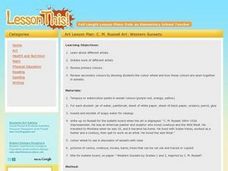Do2Learn
Emotions Color Wheel
Support emotional development with a color wheel featuring a variety of feelings. Each expression comes equipped with an informative pop-up offering a picture, its etymology, a definition, and an example statement.
Museum of Tolerance
Music Evokes Memories and Emotions
Dim the lights, take a deep breath, and press play to explore the emotions and memories that music elicits. Class members begin using relaxation techniques designed to create a positive listening experience. As music plays, learners...
MENSA Education & Research Foundation
Introduction to Color: The Foundation of Art and Design
What is the most favorite color in the world? The series of lessons all about color and the color wheel, asks kids to research color, create an eye-spy activity, watch videos, and examine the color choices made by artists in their...
North Birmingham Academy
Color Theory
What better way to learn about colors than by coloring? Starting with the primary colors, young artists follow written prompts to shade in various rectangles and a color wheel to show complementary colors, tints and shades, and more.
National Gallery of Canada
My Treehouse
If you could build your own treehouse, what would it look like? Using a piece of contemporary art as inspiration, learners draw their own treehouses and add geometric and organic shapes. The lesson touches on Visual Thinking Strategies...
Incredible Art
Tints and Shades Hanging
Here's a mobile assignment that will brighten up your classroom. Each group is assigned one color from the color wheel, paints the pure color, three tints, and three shades of that color on precut forms the group designs, and hangs the...
Curated OER
Complementary Superheroes
Students discover the color wheel. In this color lesson, students find the primary colors, secondary colors, and contrasting colors. They look through the designs of super hero logos and create their own using what they know about color.
Curated OER
Shaping the Color Wheel
When you paint you almost always use color. Budding artists explore the color wheel, color vocabulary, and painting techniques. They discuss and practice mixing colors, then paint a color wheel for personal reference.
Curated OER
Painting a Color Wheel
You have to love the color wheel, it's just so colorful! Your kids will love it too, as they work through an introductory exercise which allows them the opportunity to draw and paint a color wheel of their own. This wheel focuses on...
Curated OER
The Color Wheel
Hand out this nifty resource to make your next lesson on the color wheel a snap. It is a picture of the color wheel alongside a description of primary, secondary, and mixing colors. Great for artists of any age.
Curated OER
Weaving a Watercolor
Students examine the color wheel and work with watercolors. In this color lesson, students go over primary, secondary, and intermediate colors before watching a demonstration of watercolor brush techniques. They choose a shape to paint...
Curated OER
Mixing It Up: The Color Wheel
Colors are the focus of this color wheel worksheet. Students experiment with colors by viewing a color wheel, then filling in the primary colors which are missing on another wheel. Students also decide which colors are made when two...
Curated OER
Color Wheel Project
Students identify and describe the primary, secondary and tertiary colors.
They also identify the order in which these three categories of colors fit on the color wheel. Students then create a color wheel using any medium available...
Curated OER
Color Wheels and Schemes
Students explore how to use the color wheel in selecting fabric colors for a quilt. They define and demonstrate monochromatic, complimentary, and analogous color schemes. Lesson plan and worksheets are attached in .pdf and .doc formats.
Curated OER
Colorful Colorado
Students investigate the components of white light as viewed through a prism. The multiple colors of the spectrum produced are related to wavelengths and experienced through the creation of a color wheel.
Curated OER
Play Doh Color Wheel
Students identify primary and secondary colors, and construct color wheels, using Play Doh in the three primary colors.
National Endowment for the Humanities
Lesson 1: In Depth with the Full Spectrum
High schoolers study the ways in which an artist can use color. They view various images of artwork and discuss the effect of color on spacial dimensions, focal points, tone, and mood.
Curated OER
Let There Be Light
Students explore the relationship between light and color. They explore the NineColours computer program, blend colors, create a slideshow of hues of colors, and conduct an experiment using a flashlight and colored cellophane.
Curated OER
Alternate Theory of Color Perception
Students use the color wheel, matches, masking tape, and slides to view an alternate theory of color perception. In this color perception lesson plan, students discuss the different theories and processors.
Curated OER
Western Sunsets
Students observe and paint sunsets. In this sunsets lesson plan, students look outside and at pictures of sunsets, paint sunsets using water color or tempura paint, and cut out silhouettes from black paper and insert them into the painting.
Curated OER
Color Review Bingo
Students identify, describe and review the definitions of various key terms from the attached word list. Then, they draw a bingo card--5 columns across and 5 rows down and fill in their Bingo sheets with the terms listed. Finally,...
Curated OER
Tissue Paper Designs
Fifth graders explore the colors in the color wheel and complete a tissue art activity that includes a minimum of three different colors from the color wheel and two colors that are opposite each other on the color wheel. They discuss...
Curated OER
Warm/Cool Leaves
Students examine the difference between warm and cool colors. They discuss the basic color wheel, reviewing primary, secondary and complimentary colors. An activity allows students to discover how to mix the warm and cool colors.
Curated OER
Introductory Activity for Color Unit: Edible Color Wheel
Students use food coloring and frosting to make an edible color wheel. They identify the primary colors and experiment with mixing colored frosting to produce the secondary colors. Students then eat their color wheel.

























